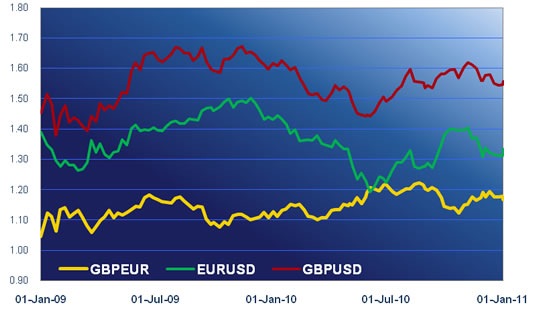– High numbers should be helpful to the pound
– UK consumer confidence improves
Good morning. The media are having fun this morning with a story about the Tunisian ex-president’s wife leaving town with a tonne and a half of gold. They all agree on the amount, 1.5 tonnes, but they are all over the place with its value. There is a vague consensus that a tonne and a half of gold is worth about £38 million but nobody comes close to the correct number; £41.3 million. That’s because they are counting 30,000 ounces to the tonne instead of 32,150.75. It’s an easy error to make in a country that sells petrol by the litre and measures miles per gallon, where draught beer is sold by the pint and bottled beer by the litre, where it is illegal to sell potatoes by the pound but compulsory to sell gold by the ounce. The troy ounce. Troy ounces are like wedding ounces; bigger and more expensive than normal ones.
Investors can buy British pounds with any unit they fancy but they tend to stick to US dollars or euros because that is where the liquidity is to be found. They were using both on Monday but it was the dollar that most of them wanted to get rid of. Compared with yesterday morning sterling is up by another US cent and by about a quarter of a cent against the euro. It is unchanged against the yen, the franc and the Canadian and New Zealand dollars; a touch lower against the Aussie dollar and the rand.
During Monday’s London session there was very little guidance from the economic data for sterling or for any other currency. The only salient figure was the net $3 billion invested in Canadian securities from abroad during November, which did nothing for the Loonie. Sterling received moral support overnight from an eight-point rise in Nationwide’s index of consumer confidence to 53 and a less ugly RICS house price balance, which improved from -44% to -39%. Japanese industrial production went up by 1.0% in November and was 5.8% higher on the year. Investors managed to avoid becoming over-excited about any of the numbers.
They will have more to enliven them today. At half past nine they will receive a reminder that inflation in Britain remains high, probably still outside its target range at 3.3%. The DCLG house price index comes out at the same time but nobody really understands it and they automatically distrust it because it is a government-sponsored statistic. The ZEW surveys of German and euro zone economic sentiment will attract the market’s interest, as will the New York Fed’s manufacturing index and the Bank of Canada’s statement on monetary policy after lunch. The US Treasury’s TIC report on capital flows is theoretically important but has slipped down the importance ladder since the financial crisis unfolded.
Tonight brings Australian consumer confidence and Japan’s tertiary industry index. It also brings a documentary on BBC2 at nine o’clock called “Britain’s banks: too big to save?” One of the contributors is Bank of England Deputy Governor Paul Tucker, who argues that banks should be allowed to go bust in the same way as any other business. The programme ought not to be damaging for sterling but it can hardly be helpful.
Ahead of that, all eyes will be on this morning’s inflation figures. High numbers should be good for the pound; low numbers are almost impossible to imagine.






